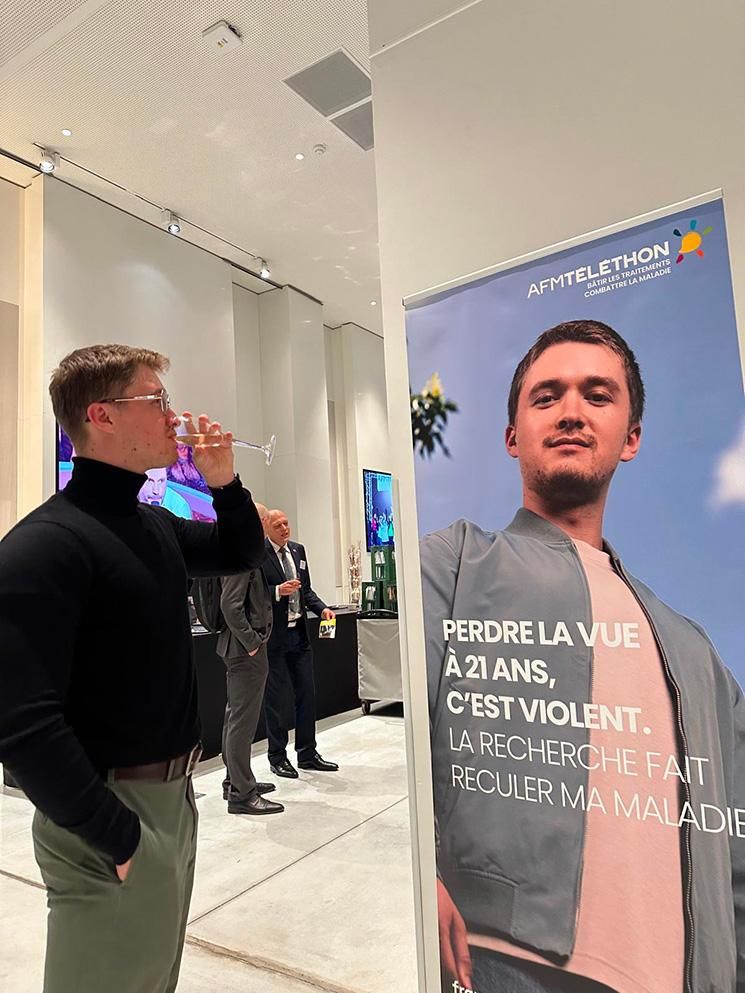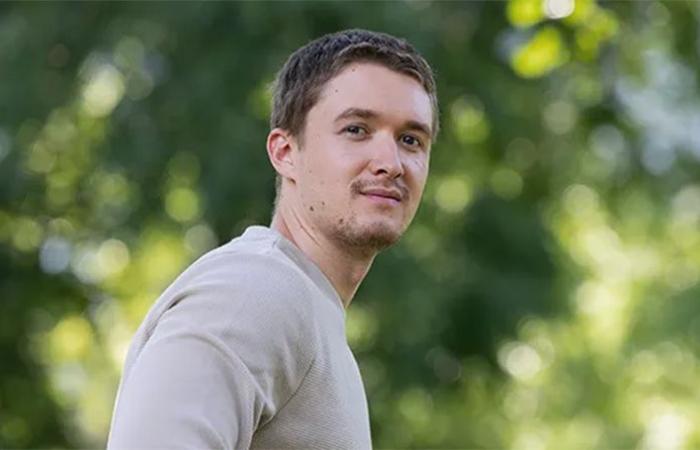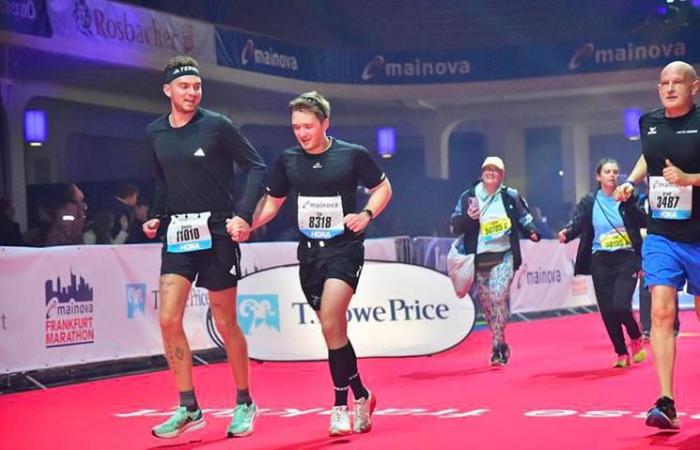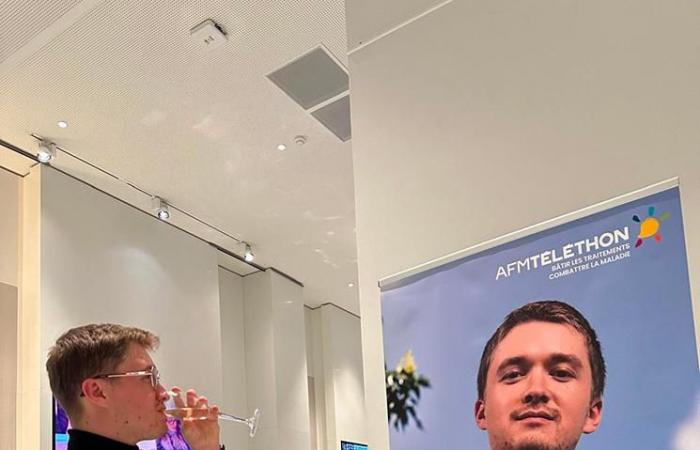At the age of choices and autonomy, the age where we experience the adult world, the illness suddenly called into question the stability of Tim’s life. At only 21 years old, this young Strasbourg resident saw a spot appear in his vision, lodged in a single eye, at the exact place where he was aiming. Initially small, this task spreads, eating away at his visual cues and his daily life. Appointments with specialists take place between February and May 2019.
“Arriving in Strasbourg, I began to understand that it was rather serious when I had four ophthalmologists and three neurologists just for me”
Transiting between Haguenau and Strasbourg, it was in the latter city that he learned of his diagnosis. The disease has a name: Leber’s hereditary optic neuropathy; a very rare disease, considered by specialists to be mysterious. In his family there was no trace of such an illness. However, Tim does not collapse. At this time, he is still able to go to appointments alone, drive, and completes his year without difficulty.
Leber’s hereditary optic neuropathy, or LHON, is a rare genetic disorder that causes rapid and significant loss of vision, often in young men aged 20 to 30. It affects the optic nerve, essential for transmitting visual information from the eye to the brain. This condition is linked to a mutation in the DNA of the mitochondria, the “energy plants” of our cells, and is transmitted exclusively from the mother. However, not everyone develops the disease, even when carrying this mutation. Symptoms often begin suddenly, with a loss of central vision, while peripheral vision remains partially functional, allowing movement. The disease then stabilizes, and cases of spontaneous recovery, although rare, have been observed. To date, there is no official curative treatment.
The fall into the unknown
“I continued to act as if everything was going really well”
After a summer full of travel, competitions for his further studies, and medical exams, the student returned to business school — at EM Strasbourg — in September 2019. Everything still seems possible. “Overbooked, I was also in a rather strange frustration, since I didn’t really know what to expect. But I haven’t put my future aside.”he confides about this busy period. Tim does not leave feeling defeated. In hindsight, he may be experiencing a form of denial.
Tim starts his year normally, but quickly loses his sight: “I barely had time to get to know the place, to understand the school properly. A little month later, my second eye was affected.” Diving so suddenly into the world of visual impairment requires a remarkable adaptation, but it is the strength of support that can change everything. This transition is made with urgency and pain, but Tim can count on the support of his school, which organizes his exams in the form of individual interviews with teachers. Tim’s entourage accompanies him and supports him in accepting his illness, a gesture for which he will remain forever grateful.
“I had no arrangements at that time. It’s not: “we lose our sight and then tack, we know Braille, they give us a new computer, we know voice synthesis, etc.”
The challenge of expatriation with a disability
In the midst of difficulties, the young man chooses to cling to his dreams. One of them is to study a year abroad, one of the advantages that his school offers. He flies to Montreal in August 2022, after overcoming an administrative labyrinth with the help of his sister. Once there, HEC Montréal welcomes him with open arms, releases a budget for arrangements, and does everything possible to support him. Tim will never forget the kindness of his interlocutor, the international exchange manager: “She came to my house to take the first trips together.”
“The disability manager told me, ‘You don’t realize that I have students who are in much less bad situations than you and who don’t even dare to set foot in school. They don’t have that life at all.” »
In this new life, Tim redefines himself. In Montreal, he discovered an academic environment that advocated collaboration and bonded with his French roommates. Despite the obstacles, he refuses to put himself aside, whether in class or in the Quebec mountains. Hikes, road trips to Vancouver, Miami or Boston, evenings with friends, he is enjoying this year more than any student.
A treatment that brings hope thanks to the Telethon
At the end of 2019, Tim received an experimental treatment developed by Gensight and funded by the Telethon which improved his central vision. This remission changes the situation one year after its injection, around October 2020. “I can read signs, see faces… Without that, I don’t think I would have dared to go abroad.” But uncertainty persists, the improvement may not be stable. Will the disease return? This question haunts some of his life choices, causing him a certain fear of commitment.
The young man remains lucid about his limits. “I don’t put barriers on myself, but each new step is a test. Everything remains fragile.” This mentality pushes Tim to view the future with caution. Professionally, he vacillates between taking advantage of his business degree or embarking on a career change into physical therapy, a profession he considers better suited to his abilities in the event of a relapse. However, he chooses to no longer build his future on the fear of what he could lose, and explains that he gave up this perspective to live more in the present moment. He then retains the possibility of returning to studies later, if his state of health or his aspirations change.
“I loved shopping before, now, much less. Now I can spend five minutes in the women’s section without realizing it and only realize afterwards.”
The daily difficulties of visual impairment
The difficulties linked to this visual handicap extend beyond vision loss. Every daily task, even the most trivial, becomes a challenge. “Shopping is an ordeal in itself. Identifying products, finding my way in a store I don’t know, all of this can take hours.” His movements require constant concentration, because his brain can no longer rely on the natural intuition of sight to avoid an obstacle. He also talks about the frustration of having to depend on others for activities that he previously carried out independently. These technical difficulties are accompanied by a deep psychological weight: the need to ask for help, the constant effort to anticipate unforeseen events, and the impression, sometimes, of slowing down those around you.
Behind his exploits, like the marathon from which he has just returned, lies a demanding daily reality. Every task, from running errands to simply crossing a street, requires colossal mental energy. Disability is as much a struggle as it is an eye-opener. He admits: “It’s not because I succeeded in Iceland that I will succeed in Italy. Each experience pushes me to surpass myself, but everything remains fragile.”
Despite your illness, traveling to escape
For Tim, traveling represents a space of freedom where he allows himself to think about something else. Since his language stay in the United States when he was 17, his love for travel has taken on a new dimension. He enthusiastically evokes road trips in the vast Quebec, hikes in the middle of its snowy forests, and wanderings to Vancouver, Montenegro, New York, Iceland and even Mexico. Each escapade is a way for him to prove to himself that everything is still possible. “I made the cliché with my best friend of showing up at the airport with a suitcase without knowing where we were going. It was a bit silly, we did it during the Covid period. We ended up in Serbia, 10 days in Belgrade. It was perfect.” he confides, smiling.
He also tells with humor the hours spent organizing his belongings or exploring store departments that sometimes escape him. His main advice to those who, like him, would like to travel: start slowly and surround yourself well. “You need to go with people you trust, who understand your needs, and above all prepare well for each stage of the trip.”
Psychological pain more than physical
“The illness and my improvement have left me with just enough vision that it’s not noticeable. Also just enough for me to be independent in everyday tasks. But not to go abroad. Also, just enough to not really see the beauty of life without making an effort. Everything is an effort, there is never a moment when we get up and say to ourselves that we are doing well.”
“It’s clear, I didn’t feel anything with the loss of my vision, but it’s an illness that is very hard psychologically and in terms of loss of self-confidence.” His journey is marked by uncertainties, but the new face of Telethon 2024 does not hesitate to plan new trips, professional projects, and retains his centers of interest. Everything is possible, both negative and positive.
We only realize what we are losing when we have truly lost it. But we can also choose to see everything we can still do. His testimony is that of a young man who refuses to let himself be defined by his illness, preferring to write a story where each step is as much a battle as a victory.
Tim often talks about his “luck in bad luck”summarizing well the duality of his experience. Although faced with a rare disease, he had the opportunity to benefit from a clinical trial which transformed his daily life. He attributes this opportunity in part to the Telethon, which he considers to be a “shadow heroes”having financed his treatment without his being aware of it at the start. This feeling of gratitude coexists with a certain lucidity: everything has not returned to being the same as his life before, but this improvement is a precious step forward and a source of hope for him and for so many others. It allowed him to start a third life.
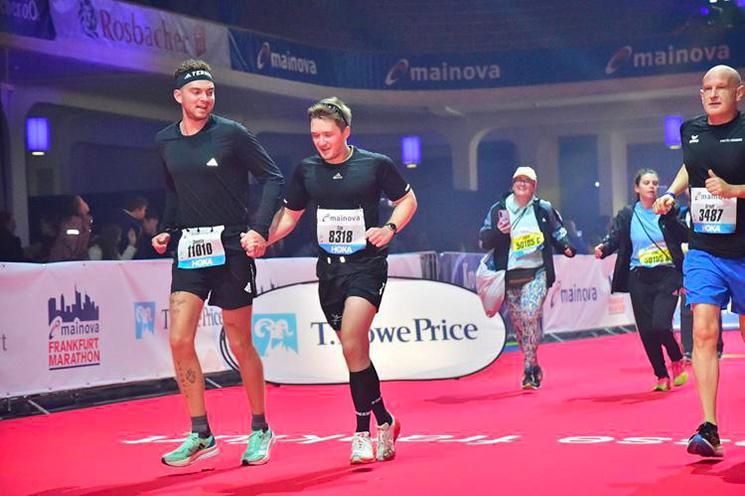
Tim for the 2024 Telethon
Tim is one of the 5 ambassadors of Telethon 2024. He shares his story and emphasizes the essential impact of medical research and the generosity of donors. It carries a message of hope by showing that these advances benefit not only patients suffering from rare diseases, but also research into more widespread pathologies. Since becoming ambassador, he says he has broken a sort of shell of insensitivity affecting many subjects. This human experience has shaped him, making him more empathetic and resolutely focused on the future.
The role of ambassador makes him a living link between researchers, donors and patients, while raising public awareness of the urgent financial and human needs to continue to advance research. Thanks to donations, people like Tim are offered a chance to regain full control of their lives thanks to the treatments implemented by Généthon experts. Individuals and companies can make a donation to the AFM-Téléthon association which finances the Généthon laboratory. To make a one-time or regular donation, click here.
“I really like the expression shadow hero, because that’s what the Telethon represents for me: a benevolent association which financed my treatment without me realizing it.”
